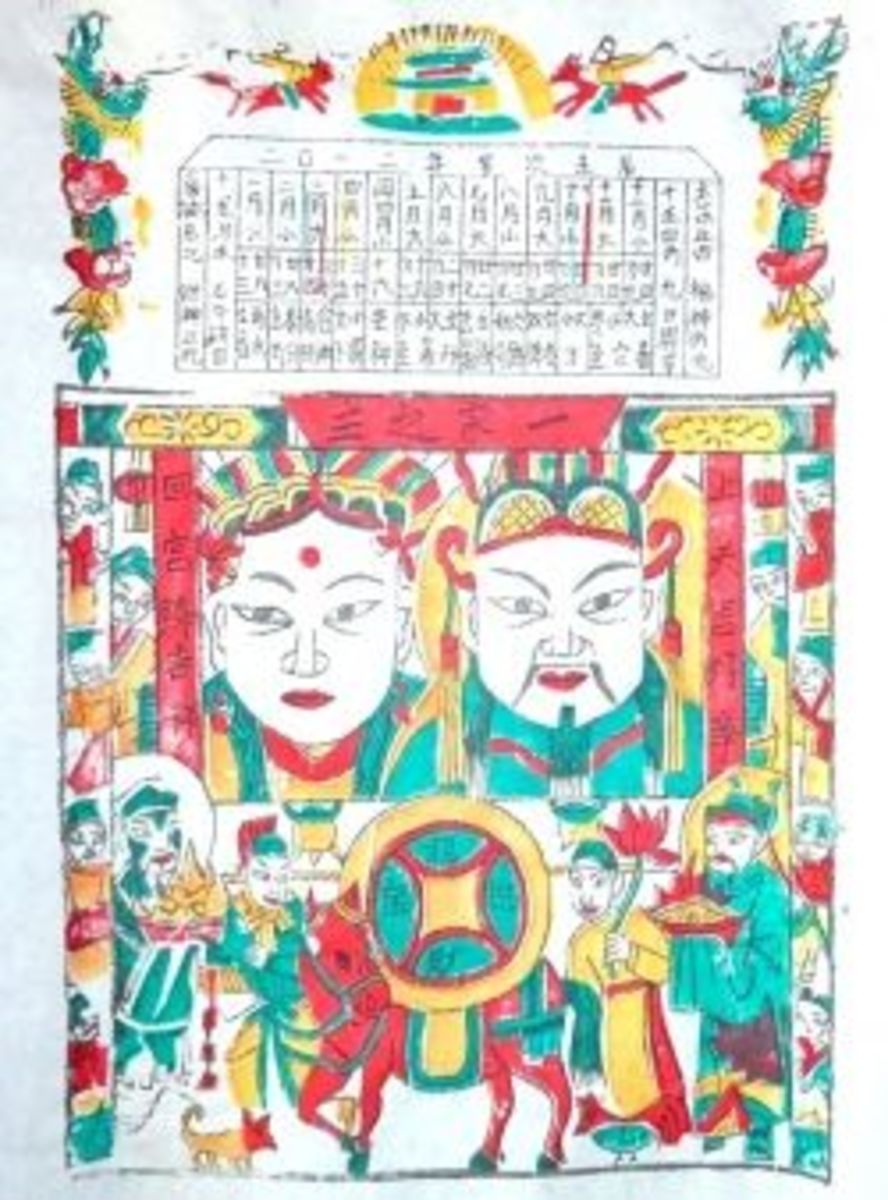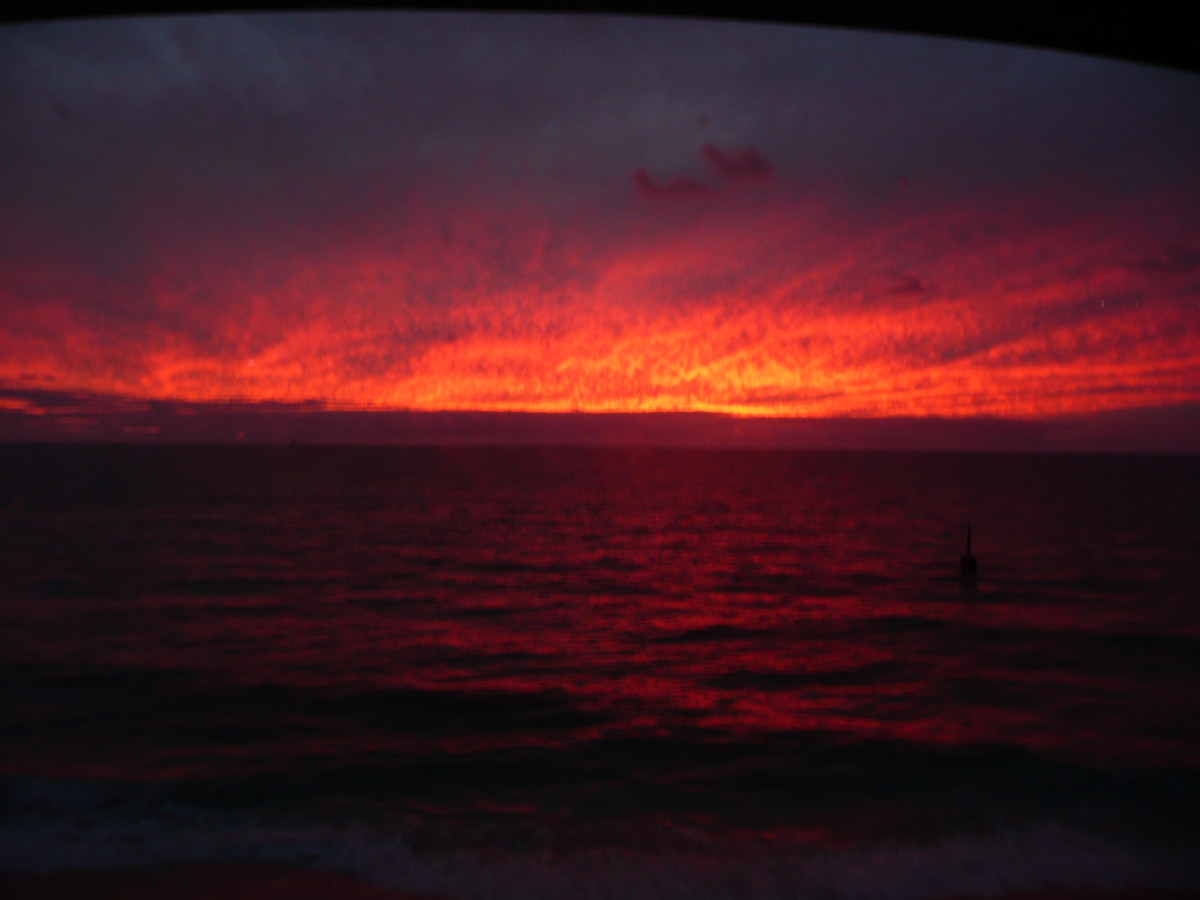Chinese Festivals | Ghost Festival

Chinese Ghost Festival ~ Let's Burn Money, Offer Food, Talk to Ghosts and Pray
Chinese Ghost Festival, or Zhong Yuan Jie, is held to placate the spirits of dead ancestors. The whole of the seventh lunar month is said to be a ghostly one, culminating in the festival held on the fifteenth day of the month. Many Chinese people prefer to stay indoors on this evening, as the restless souls of the departed are said to wander about, looking for food and comfort. There's no swimming this month, either, as it causes vulnerability to ghostly intrusion!
Image by... I'm Fantastic | Lens Updated: September 8th, 2012 @ 10:25 am Beijing time.
Respect ghosts and gods, but keep away from them ~ Confucius
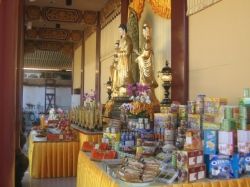
Read More About Zhong Yuán Jié on Wikipedia
Have a look at what the online reference says about ghosts...
The Ghost Festival (zhong yuán jié, alternatively, gui jié) is a traditional Chinese festival and holiday, which is celebrated by Chinese in many countries. In the Chinese calendar (a lunisolar calendar), the Ghost Festival is on the 15th night of the seventh lunar month.
In Chinese tradition, the fifteenth day of the seventh month in the lunar calendar is called Ghost Day and the seventh month in general is regarded as the Ghost Month, in which ghosts and spirits, including those of the deceased ancestors, come out from the lower realm. During the Qingming Festival the living descendants pay homage to their ancestors and on Ghost Day, the deceased visit the living.
On the fifteenth day the three realms of Heaven, Hell and the realm of the living are open and both Taoists and Buddhists would perform rituals to transmute and absolve the sufferings of the deceased. Intrinsic to the Ghost Month is ancestor worship, where traditionally the filial piety of descendants extends to their ancestors even after their deaths. Activities during the month would include preparing ritualistic food offerings, burning incense, and burning joss paper, a papier-mache form of material items such as clothes, gold and other fine goods for the visiting spirits of the ancestors. Elaborate meals would be served with empty seats for each of the deceased in the family treating the deceased as if they are still living. Ancestor worship is what distinguishes Qingming Festival from Ghost Festival because the latter includes paying respects to all deceased, including the same and younger generations, while the former only includes older generations. Other festivities may include, buying and releasing miniature paper boats and lanterns on water, which signifies giving directions to the lost ghosts and spirits of the ancestors and other deities.
The Ghost Festival shares some similarities with the predominantly Mexican observance of El DÃa de los Muertos. Due to theme of ghosts and spirits, the festival is sometimes also known as the Chinese Halloween though many have debated the difference between the two.
read more on Wikipedia
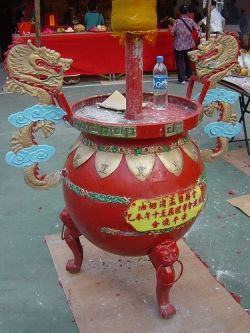
Chinese Ghost Festival ~ Religious Background
Buddhism, Confucianism and Taoism Origins About Ghosts...
Buddhist Origins - The Buddhists treat the 7th lunar month as one of joy. During the lifetime of Buddha, the 15th day of the month is when his disciples emerged from the forests, after long periods of meditation, when the rainy season finished. He was pleased with the process of enlightenment of these monks and was, therefore, full of joy.
It was also the day when Buddha gave his arhat, Maudgalyayana, the Ullambana Sutra on how to release his mother from the fiery depths of hell by food offerings and rituals. After many years of obedience, he succeeded!
Ullambana Ritual image by stewartcc.
Confucian Origins - The doctrine of filial piety (respecting and obeying parents example) comes from Confucius, and is still a major influence on behaviour in modern China. The huge efforts of Maudgalyayana to save his mother from the depths of hell strike an accord with Chinese Buddhists.
Taoist Origins - Taoist doctrine states that there are three basic elements that are the origins of everything: heaven, earth and water - "San Yuan (Three Elements)" - produced during the flowing process of time and space. The official of heaven, Lord Ziwei, brings blessings and was born on January 15th. We celebrate Shangyuan Festival (Lantern Festival) for him. The official of earth, Lord Qingxu, absolves sins and was born on July 15th. We celebrate Zhongyuan Festival for him. The official of water, Lord Dongyin, prevents disasters and was born on October 15th. We celebrate Xiayuan Festival for him.
During these festivals, the three officials descend to earth and perform their duty. The official of earth, Lord Qingxu, releases the dead from suffering at the Zhongyuan Festival. Those who have committed sins can also pray for absolution. During Zhongyuan Festival a "Taoist rite" is held in temples to pray for the underprivileged.
The Legend of Mu Lian Saving His Mother - The story of a son who did his utmost to rescue her...
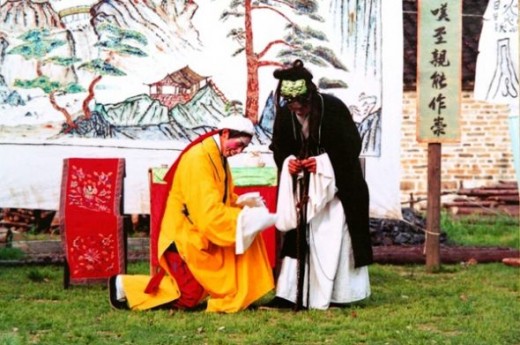
There are many versions of this tale, and there is some debate as to whether Mu Lian is simply the Chinese name for Maudgalyayana or not. Be that as it may, the story of Mu Lian is that of a young man who left home to become a monk, contrary to the doctrines of Confucian filial piety, as his mother wished him to stay and look after her.
When he had completed his training, he found that his mother was deceased. After intense meditation and prayer, Mu Lian sensed that his mother had been cast into the depths of hell for her past sins that he was unaware of! As an obedient son, he used all the powers at his disposal to attempt to rescue her from her plight. By fasting, praying and offering sacrifices of food and spirit money to the Lord of the Dark Realm, Mu Lian was able to rescue his mother from being a hungry ghost, forever looking for redemption.

Why Have 'Burnt Offerings' on Ghost Festival?
Food, imitation money, yuanbao, tv sets and cars for ghosts...
The Chinese are very superstitious about this event, and believe that they need to placate the spirits of their ancestors and other hungry ghosts with offerings of food, money and other useful objects. The money is fake and available from street corner vendors to burn as "hell money". Other objects such as paper television sets, cars and stereo systems are burnt so they can make their way into the spirit world and become useful for the hungry ghosts.
The image shows imitation paper money (issued by "The Bank of Heaven and Earth") and yuanbao (imitation ingot) burnt at ancestors' graves around the time of the Ghost Festival. (Jiangsu Province). Image License | Wikimedia Commons
Ceremonies & Taboos for Chinese Ghost Festival - Here's some do's and dont's for the uninitiated participant...
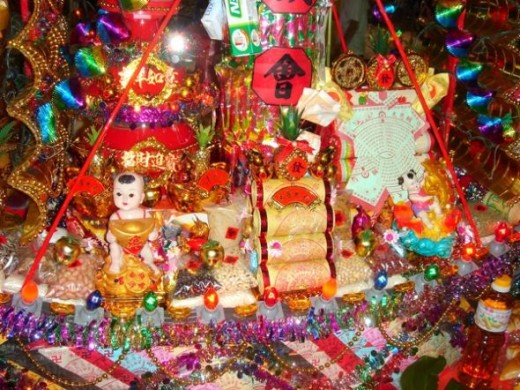
Image by Wm Jas
Things You Should Do:
~ Make an altar at a crossroad - for easy access and departure for spirits from 4 directions.
~ Make offerings - food, drinks and favoured articles of the deceased.
~ Burn "Hell Money" - so it becomes available to ancestors in the kingdom below.
~ Release paper boats and lanterns in rivers and lakes - it gives directions to spirits.
~ Talk to your ancestors - they can hear you on this day.
Things You Shouldn't Do:
~ Go swimming - it leaves you vulnerable to ghostly interception.
~ Go outside after sunset - the troubled spirits are everywhere at this time of year.
~ Move house at this time - it vexes the spirits who can no longer find their ancestral home.
~ Open a business - it's just plain bad luck and bad sense.
~ Hold a wedding ceremony - again, it's bad luck and bad sense.
~ Get born on this day - your parents should change your birthdate if you do.
~ Die on this day - you'll be whisked away to hell and damnation with all the other spirits.
Mu Lian Rescues His Mother, On Amazon - Famous Beijing Opera aria is now available for download...
Did you enjoy reading about Zhong Yuan Jie or "Chinese Halloween" as it is sometimes known? Leave your comments and questions below. Please take the time to rate this lens a "thumbs up" at the top LH corner of the page. If you enjoyed it, you may care to mark it as a favourite as well.
Not a Squidoo member yet? You're missing out on all the fun. Squidoo is free to join and use, and you can even make some money for your favourite charity, our even for yourself (gasp). Go ahead, make my day and make your first lens now.
Image: Greekgeek
Are you on Twitter? Please give it a retweet ==>


